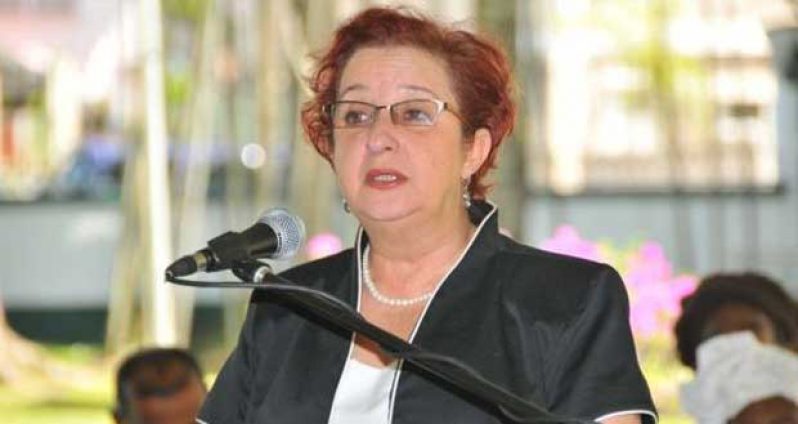GUYANA moved up five points on the 2015 World Press Freedom Index and currently ranks 62 out of 180 countries, with a rating of 27.21 – an important accomplishment, according to Presidential Advisor on Governance, Gail Teixeira.“I think Guyana has done well, considering all that has been happening, a five-point increase is important for us and we urge media to ensure they uphold the tenets of a professional media corps,” she said in a recent interview.
Teixeira underscored that press freedom is an important indicator of freedom of expression and freedom of information.
“We have shown improvements,” she said, adding that there are a total of 20 television stations, 13 radio stations and four daily newspapers, which placed control of the mass media in the private sector.
The Reporters Without Borders’ World Press Freedom Index ranks the performance of 180 countries according to a range of criteria that include media pluralism and independence, respect for the safety and freedom of journalists, and the legislative, institutional and infrastructural environment in which the media operate.
The 2015 World Press Freedom Index highlights the worldwide deterioration in freedom of information in 2014. Beset by wars, the growing threat from non-state operatives, violence during demonstrations and the economic crisis, media freedom is in retreat on all five continents.
Topping the World Press Freedom Index list are three Scandinavian countries: Finland, which has been in first place for five years in succession, followed by Norway and Denmark. At the other end of the scale, Turkmenistan, North Korea and Eritrea, in last place, were the worst performers. France is ranked 38th (up one place), the United States 49th (down three places), Japan 61st (down two places), Brazil 99 (up 12 places), Russia 152 (down four places), Iran 173rd (unchanged) and China 176th (down one place).
The Presidential Advisor on Governance noted that the global decrease in press freedom standards is disconcerting.
According to the report, there was a drastic decline in freedom of information in 2014. Two-thirds of the 180 countries surveyed for the 2015 World Press Freedom Index performed less well than in the previous year.
She acknowledged too that a factor considered by the Reporters Without Borders report is the kind of reporting emanating from the countries under review. “The media itself is an important indicator,” Teixeira said.
Guyana was first included in the Reporters ‘Without Borders’ World Press Freedom Index in 2008, at which point it ranked 88 out of 188 countries.
DEEMED FREE
Since the launch of the Press Freedom Index report, another body, Freedom House, also made public its report, ‘Discarding Democracy: Return to the Iron Fist’, which assesses the level of freedom globally.
Guyana was deemed free by Freedom House with an overall rank of 2.5 out of 10, with 10 being the worst.
Freedom in the World 2015 evaluates the state of freedom in 195 countries and 15 territories during 2014. Each country and territory is assigned two numerical ratings – from 1 to 7 – for political rights and civil liberties, with 1 representing the most free and 7 the least free. The two ratings are based on scores assigned to 25 more detailed indicators.
Guyana secured a score of 2 for political rights and three for civil liberties. “In the scores in terms of freedom we are considered high,” Teixeira said.
The average of a country or territory’s political rights and civil liberties ratings determines whether it is Free, Partly Free, or Not Free. The methodology, which is derived from the Universal Declaration of Human Rights, is applied to all countries and territories, irrespective of geographic location, ethnic or religious composition, or level of economic development.
The Presidential Advisor said, “The report is an indicator of whether countries are called free, in terms of press, partly free or not free. Guyana from 1973 to 1993 was viewed not free and we all know why. One has to take in context that from 1993 onwards to now, 21 years later, Guyana is called partly free and it has been constantly increasing its move upwards and improving its freedom.
“While a number of countries have gone down…many others have gone up. What is also interesting is that Guyana in the Americas is listed as 17 out of 35 countries…we came out sort of middle.”
Freedom in the World assesses the real-world rights and freedoms enjoyed by individuals, rather than governments or government performance per se. Political rights and civil liberties can be affected by both state and non-state actors, including insurgents and other armed groups.
Teixeira added that Guyana’s progressive advances are reflected on two reputable international reports and are reflective of consistent trends.
“It is important for Guyanese to note that Guyana is considered a free country,” she concluded.
(By Vanessa Narine)




.png)









